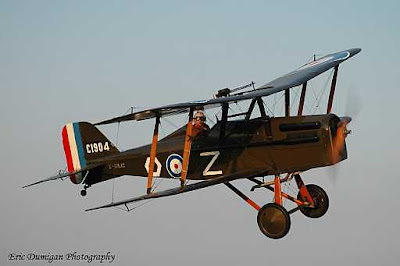 |
| A young W.B. Yeats |
Tonight, yet again, I wish to reproduce here a poem by that greatest of Irish poets W.B. Yeats. In this year of centenaries as we Irish call this commemorative year of 2016, that is, that it celebrates both our national Rising and some of the greatest battles of the Great War.
An Irish Airman
Foresees His Death
(By W. B. Yeats, 1865 – 1939)
I know that I shall meet my
fate
Somewhere among the clouds
above;
Those that I fight I do not
hate
Those that I guard I do not
love;
My country is Kiltartan Cross,
My countrymen Kiltartan’s poor,
No likely end could bring them
loss
Or leave them happier than
before.
Nor public man, nor cheering
crowds,
A lonely impulse of delight
Drove to this
tumult in the clouds;
I balanced all,
brought all to mind,
The years to come
seemed waste of breath,
A waste of breath
the years behind,
In balance with
this life, this death.
Commentary
Yeats
wrote this famous poem "An Irish Airman Foresees His Death" in 1918 and it was first published
in the Macmillan edition of The Wild
Swans at Coole a year later. It is a rather simple lyric written in regular
metre, that of iambic tetrameter, that is, in regular lines with four beats or
four iambs, that is, “Dee-Dah, Dee-Dah, Dee-Dah, Dee-Dah” with the beat on the
second syllable or on the “Dah.” The
rhyme scheme is pretty standard, too, being simply ABAB CDCD EFEF GHGH. Further, if the reader is a lover of war
films he will know that in the movie Memphis Belle, the character
Sergeant Danny Daly recites this
poem but omits the lines referring to Ireland.
The
poem is a dramatic recitation or soliloquy given by an aviator
or early flyer from the First World War period in which the
narrator describes the circumstances surrounding his imminent and certain death.
The poem is a work that discusses the role of Irish soldiers fighting for the United
Kingdom during a time when they were trying to establish independence for Ireland. This was a heady, frightening and tumultuous
time in Irish history when families were split between loyalty to the crown and
sympathy with the revolutionary nationalist cause. In simple terms, this was a
complex and complicated period in Irish history. Wishing to show restraint from
publishing political poems during the height of the war, Yeats withheld
publication of the poem until after the conflict had ended.
Yeats’
young pilot is just that, young and simply non-partisan. For him it was the
adventure of flying itself, then a real novelty, that inspired his action –
neither loyalty to the crown nor love for his native soil. In this, Yeats
captures brilliantly the way a good number of young men would have felt – that is,
young men who were full bloodedly wishing to embrace adventure for adventure
sake:
I
know that I shall meet my fate
Somewhere among the clouds
above;
Those that I fight I do not
hate
Those that I guard I do not
love;
My country is Kiltartan Cross,
My countrymen Kiltartan’s poor,
No likely end could bring them
loss
Or leave them happier than
before.
He
tells us that no outcome in the war will make their lives worse (“bring them
loss”) or better (“happier”) than before the war began. He says that he did not
decide to fight because of a law or a sense of duty, nor because of “public
men” (politicians) or “cheering crowds.” Rather, “a lonely impulse of delight”
drove him to “this tumult in the clouds.”
 |
| A First World War Airplane |
No comments:
Post a Comment